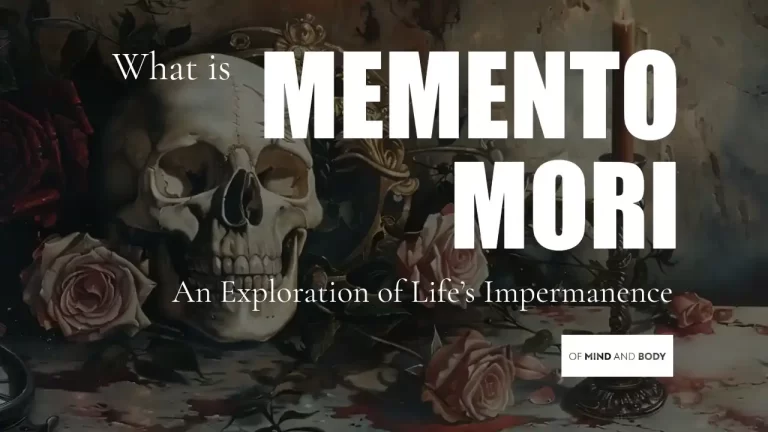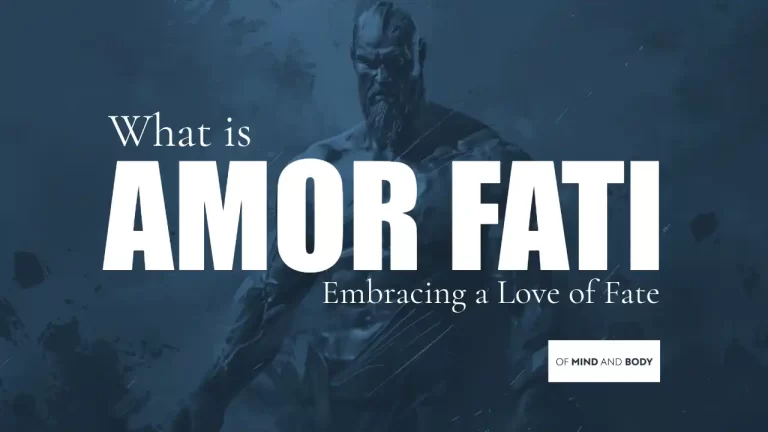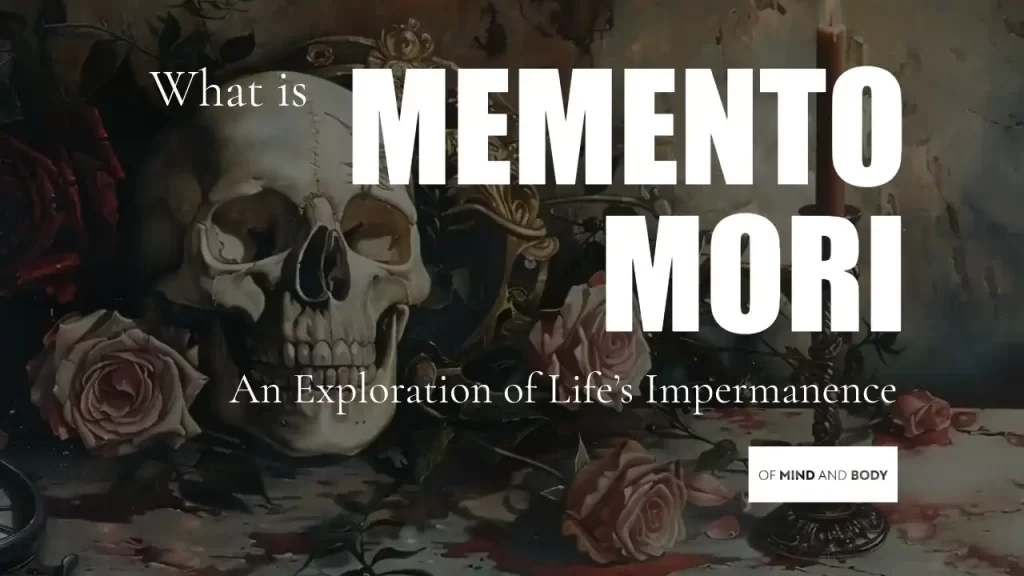
Defining Memento Mori: Origins and Meaning
What Does Memento Mori Literally Mean? (Memento Mori Translation)
Memento Mori, a resonant Latin phrase, translates starkly to “remember you must die.”
This axiom served as a ritualistic reminder during the zenith of the Roman Empire, aimed to temper the egos of victorious generals. In public celebrations, a slave would murmur this phrase to the adorned leader, symbolising the transient nature of mortal triumphs and the ubiquitous shadow of mortality. This practice encapsulated the essence of humility in the face of impermanence—a cornerstone in Stoic philosophy.
The Historical Significance and Meaning of the Memento Mori Symbol
Over centuries, the symbol of Memento Mori has permeated various cultures, embedding itself in the collective human conscience as a profound memento of life’s fleeting nature. In medieval Europe, it found expression in art, from the grim depictions in the Danse Macabre, or Dance of Death, to morbidly ornate tomb sculptures that depicted decaying corpses, known as transi tombs.
These artistic manifestations were not merely Gothic fascinations but philosophical statements on the vanity of earthly status and wealth. As the concept transitioned through ages, it continually reminded humanity to anchor their existence in the pursuit of meaningful endeavours beyond material accumulation.
The Philosophical Depth of Memento Mori
Stoic Reflections on Mortality (Memento Mori Quotes)
Stoicism, an Hellenistic philosophy that emphasises rationality and fortitude, regards Memento Mori as a tool to foster existential awareness and ethical living. Marcus Aurelius, a Stoic philosopher-emperor, wrote extensively on this theme in his meditations, advocating for a life spent in harmonious acceptance of one’s eventual demise. His reflections encourage a focus on living a virtuous life, stating,
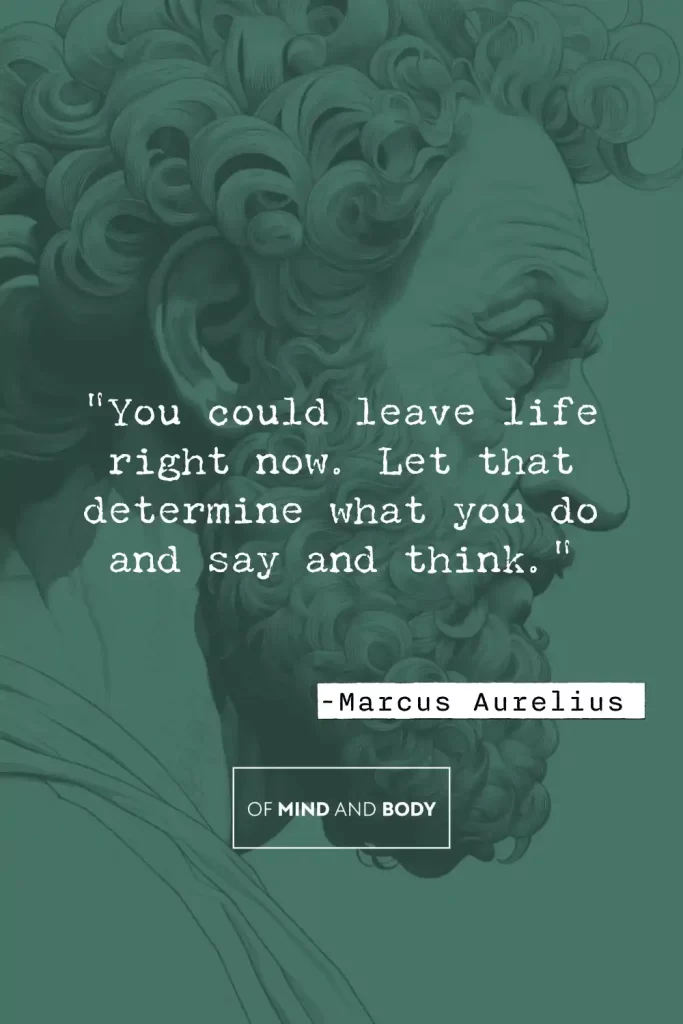
This quote embodies the Memento Mori ethos by highlighting the unpredictability of life’s duration. It urges us to live in a way that reflects a constant awareness of life’s fragility, suggesting that our actions, words, and thoughts should be influenced by the understanding that any moment could be our last. This awareness is intended to focus our priorities and behaviors towards more meaningful and considered choices.
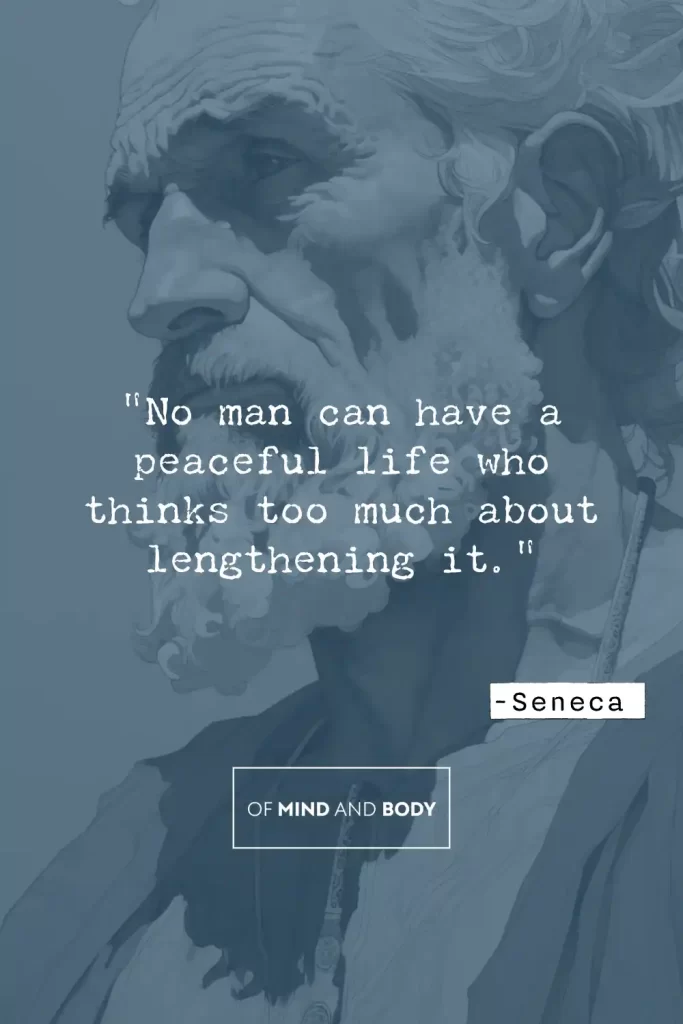
Seneca’s insight warns against the anxiety that comes from overly clinging to life, particularly the pursuit of extending it at all costs. This aligns with Memento Mori by reinforcing the idea that peace comes from accepting death as a natural and inevitable end. By letting go of the fear of death, we can live more fully, unburdened by the constant dread of losing life, thus leading to a more serene existence.
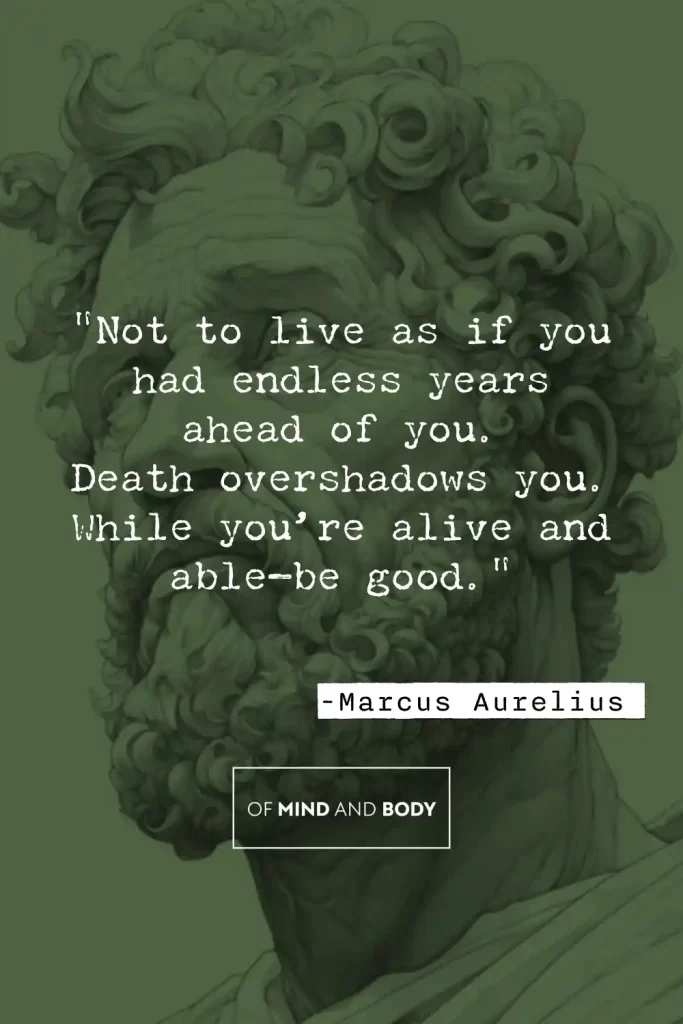
Here, Aurelius points to the motivational aspect of Memento Mori. He advises against procrastination and complacency, which often stem from the illusion of endless time. Instead, he calls for a life lived ethically and with good intent, fully aware that death may come at any moment. This stoic reflection pushes us to live virtuously and to make the most of our time by focusing on benevolence and integrity.
Such quotes underline the Stoic belief in living with dignity, guided by the inevitability of death, to elevate one’s moral compass.
Is Memento Mori a Good Saying?
Indeed, “Memento Mori” transcends its foreboding overtone to serve as a vital existential prompt: it is a clarion call to engage fully with life’s every moment. By embracing our mortality, we are impelled not towards nihilistic resignation but towards a more profound participation in our lives.
In other words, when we recognise the inevitability of death, we are not led to a sense of futility or despair, but rather are motivated to engage more deeply with the life we have. This perspective doesn’t draw us into hopelessness; instead, it invites us to fully immerse ourselves in our experiences, cherish the present, and live with purpose and intent.
This maxim acts as a counterbalance to complacency, kindling a continuous appreciation for the transient now. Thus, Memento Mori resonates not just as a good saying but as a pivotal life philosophy, encouraging individuals to live with intentionality and resolve, mindful of the impermanence that defines our existence.
Does Memento Mori Mean Remember the Dead?
While “Memento Mori” is often misconstrued as a call to remember the dead, its essence lies in reminding the living of their own mortality. The adage serves not as a morbid fixation on death but as a motivational tool to enhance existential awareness and inspire a more deliberate approach to life. It prompts individuals to reflect not on death per se but on how the inevitability of death can refine our life choices and priorities.
Memento Mori in Cultural Contexts
Global Interpretations of Remembering Death (Remember You Will Die)
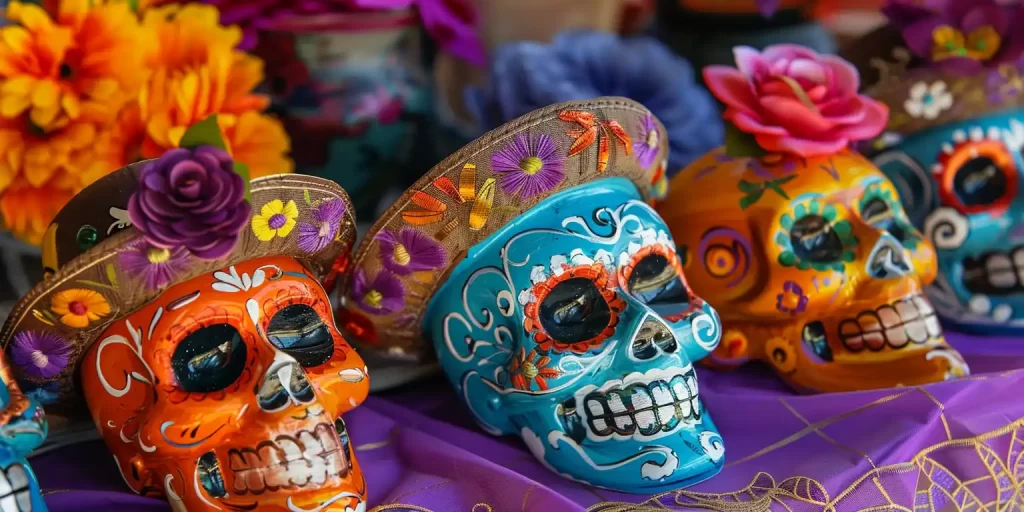
In Mexico, the Día de los Muertos (Day of the Dead) exemplifies a unique embrace of mortality. This vibrant festival combines remembrance with celebration, as families honour departed loved ones with altars, music, and marigolds, turning grief into a colourful homage to life’s cyclical nature. Such traditions underscore a communal acknowledgement of death, weaving it into the fabric of life rather than shrouding it in taboo.
Who Said Memento Mori?
The phrase “Memento Mori” has been echoed by numerous thinkers and writers throughout history, each adding their contour to its contemplation. The Roman philosopher Seneca often expounded on the brevity of life, urging in his letters that one should live as if on the brink of death.
Michel de Montaigne
In more recent times, philosopher Michel de Montaigne adopted this maxim as a central theme in his essays, arguing that to philosophise is to learn how to die.

In his essays, Montaigne advocates for a life lived with awareness of death’s inevitability, suggesting that such awareness helps to cultivate a better life. He didn’t use the term “Memento Mori” directly, but his works convey a similar sentiment—emphasising the importance of living a meaningful life in the face of our mortality. He discusses how contemplating death can strip away the superficialities of life, leaving the essence of what is truly important. This reflection is meant to liberate rather than paralyse, encouraging a life of authenticity and purpose.
Ernest Hemingway
Writers like Ernest Hemingway have also woven this awareness of mortality into their literary fabric, using it to delve deeper into the human condition, exploring themes of valour, despair, and existential bravery.

How to Apply Memento Mori Today
Integrating the Memento Mori philosophy into daily life can be transformative, offering a grounded perspective in the often frenetic pace of modern existence. Simple practices like maintaining a daily journal to meditate on the day’s experiences or setting reminders of personal mortality can create a reflective rhythm to everyday life. Here are some additional ways people can integrate this ancient reminder into modern living:
Visual Reminders:
People can place symbols or artworks that represent Memento Mori in their homes or work spaces. For instance, a small skull on a desk, a framed picture of a classic Memento Mori painting, or even a wallpaper on a computer or smartphone can serve as constant reminders of life’s fleeting nature. These visual cues help to ground thoughts and actions in the present and foster a more mindful way of living.
Reflective Writing Prompts:
Beyond keeping a journal, individuals could use specific prompts related to Memento Mori to guide their reflections. Questions like “What would you do today if you knew it was your last?” or “How do you want to be remembered?” can provoke deep thinking about one’s life choices and priorities.
Mindfulness and Meditation:
Incorporating meditation practices that focus on the nature of impermanence can help internalise the message of Memento Mori. Meditations could specifically concentrate on the temporary aspects of one’s thoughts, feelings, and bodily sensations, reinforcing the transient nature of existence.
Annual Reflection Rituals:
Adopting personal rituals or annual events that prompt reflection on past years can be powerful. This might include writing an annual letter to oneself about accomplishments, disappointments, and lessons learned, or even creating a personal “year in review” that highlights the brevity and beauty of life’s key moments.
Philosophical Discussions:
Engaging in regular discussions about life, death, and purpose with friends or in community groups can normalise conversations about mortality and enrich participants’ perspectives. This can also be facilitated in book clubs focused on literature dealing with these themes or community philosophy sessions.
Legacy Projects:
Initiating projects that have a long-term impact—such as planting a garden, writing a book, or starting a community initiative—can be a means of putting into practice the idea that life is short but contributions can last. These projects serve as a legacy of one’s values and actions, embodying the essence of Memento Mori by perpetuating one’s influence beyond their lifespan.
Technology today also embraces this ancient wisdom through apps that send daily reminders of life’s finitude, encouraging users to live each day with zest and purpose. In a world brimming with distractions, these modern tools reconnect us with the Stoic tradition of mindful mortality, proving that the old adage still holds poignant relevance.

Final Thoughts
Memento Mori, far from being a mere echo from antiquity, continues to offer a vital lens through which to view our existence. It challenges us to focus on what truly matters—forging meaningful relationships, pursuing passions, and living with integrity.
By reminding us of life’s impermanence, it enhances our engagement with the present and motivates us to act with kindness and courage. Whether through ancient rituals or modern digital reminders, Memento Mori remains a profound call to embrace life fully, aware of its transient yet precious nature.

